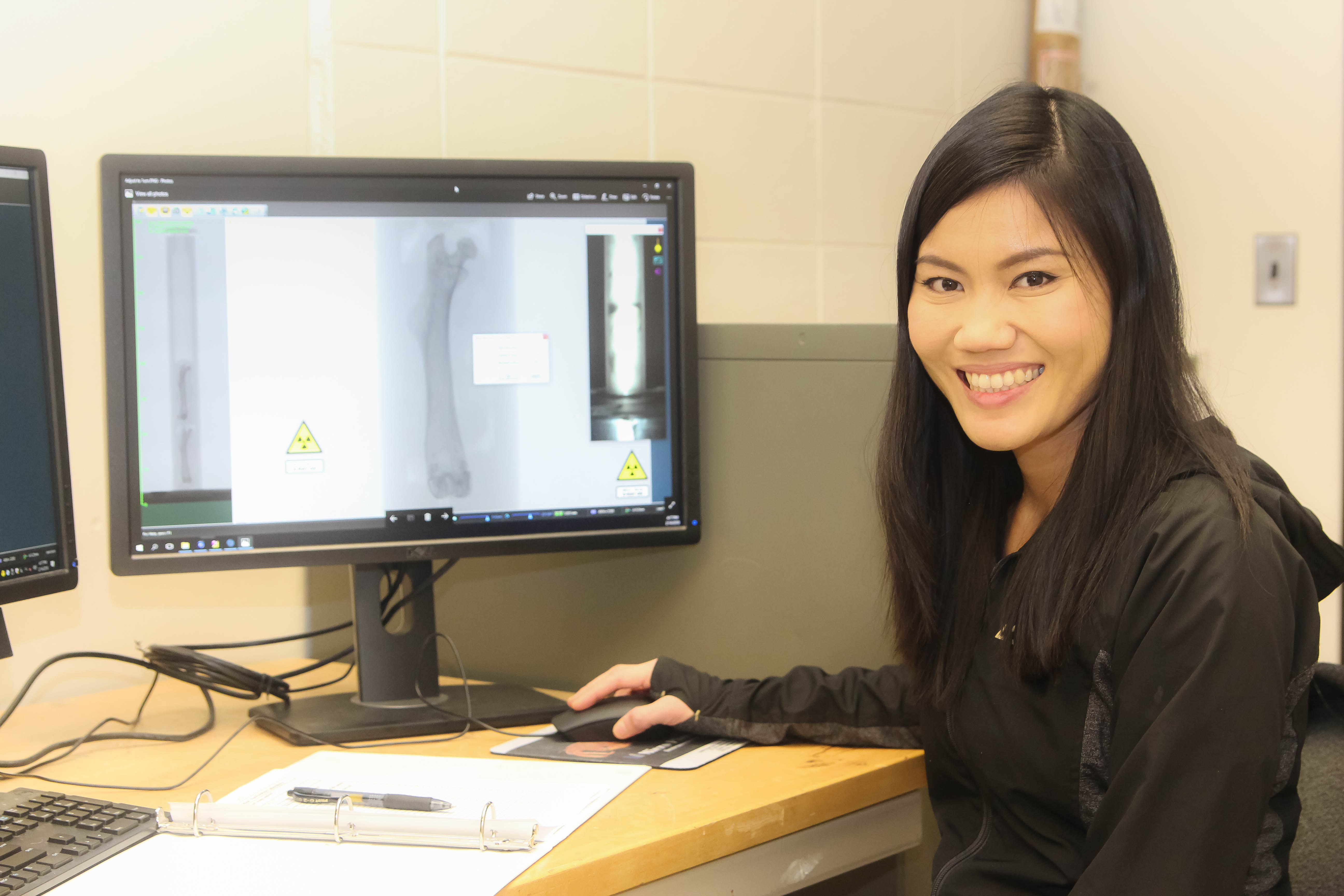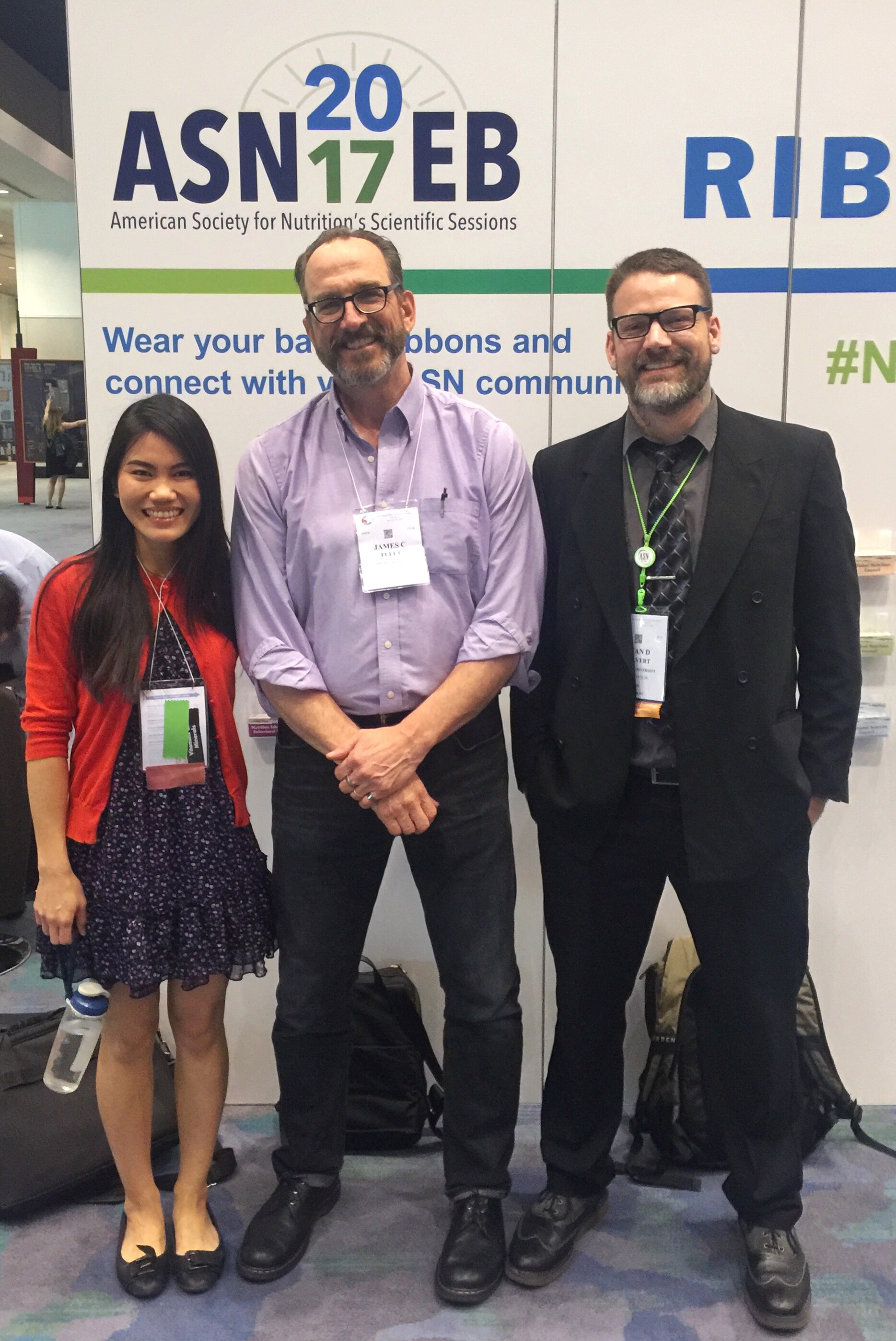Krittikan Chanpaisaeng

Nutrition
Mentor / Lab:
James C.Fleet
Specific Research Area / Project:
Trabecular Bone in the Distal Femur and L5 Spine are Differentially Influenced by Dietary Calcium Restriction and Genetics in Growing Mice
Undergraduate Institution:
Chulalongkorn University, THAILAND
Research Profile:
We are all biologically and physically different. My research focuses on how different natural genetic variations play a role in regulating our health in responding to the diet we eat. This fascinating field is known as "nutrigenetics." I am working with Dr.James C. Fleet and our lab is interested in calcium metabolism, bone health and the role of genetics. To be more precise, we would like to identify the potential causal genes or genetic polymorphisms that make some people more vulnerable to low bone mass when being under dietary calcium stress. We chose to use a recombinant inbred mouse model answer this question because of several advantages this mouse model provides including traceable genetic backgrounds and an ability to control environmental factors.
Previously, we have found that there is the site-specific impact of dietary Ca restriction and this impact also varies by genetic background. This information is valuable for understanding how we can prevent osteoporosis by trying to achieve the highest bone mass and strong microarchitecture possible at an early age.
In this particular project presented at OIGP Spring Reception 2018, I reported the results from an investigation of how genetic variations interact with dietary Ca intake to modulate bone mass and microarchitecture. From this study, I have identify novel candidate genes including Wisp2, Lins2 and Lrrk1 genes that show potential crucial roles in dictating how individuals will response to dietary Ca. A variation of a single nucleotide in one of these genes was strongly associated with dramatic change of bone mass and bone structure in our animal model.
The take home message from this study is the natural genetic variations determine how individuals' bone mass and microarchitecture respond to dietary Ca intake. Individuals who carry a certain single nucleotide variation in these genes we identified may be more prone to weaker bone structure in the lumbar spine. Therefore, knowledge generated from this study serves as a foundation for personalized nutritional recommendations.
About Me:

I had a background in Pharmacy and I have learned that drugs and synthetic chemicals can tremendously help treating and, in some case, preventing us from harmful diseases. However, from my work experience in drug safety field, I am aware that every medication comes with adverse effects. I don’t refuse that we need medications in certain cases but, in my opinion, the best way to treat diseases is to prevent its occurrence at the first place. Balanced diet and lifestyle factors that we expose to everyday play such an important role in maintaining our health. This concept totally changed the way I live my life and I decided to shift my gear from pharmacy to nutrition person. I would like to be part of driving our world community to live a better life.
One of the main reason I came to Purdue is because my previous advisor from the college is an Purdue alumnus. He is my role model particularly as a scientist. When I found that there is one professor here working in the area I am interested, I decided that Purdue would be the best choice for me. My experience here so far has been great. I like how the interdisciplinary nutrition program is set up and I feel inclusive in this student community. I always feel so fortunate and humble to have a chance to work with my current advisor. He is such a great mentor and wonderful teacher. This only less than one year experience at Purdue already ensure me that I will succeed in my PhD study and my future endeavor.
My long-term career goal is to utilize the knowledge I have to conduct research in the field of nutrition and genetics/enomics particularly in Asian populations (as I think they are under-studied and they also expose to different culture and environment compared to European descend population). I have a researcher position waiting for me at the biotechnology research institute in Thailand (BIOTEC), in which I could find research opportunities and collaborations. Additionally, I would like to encourage people to pay more attention to what they can do (diet and other lifestyle modifications) to live the best out of their lives even though they might be susceptible to some chronic disease (with their genetics). With a growing body of scientific information, people should have higher quality of life and live healthily.
Awards:
- 2012-2018 Royal Thai Government Scholarship for Graduate Study in the U.S.
- 2017 Selected participant to attend the Endocrine Fellows Foundation/American Society of Bone and Mineral Research (ASBMR) 11th Fellows Forum on Metabolic Bone Diseases.
- 2017 Selected Presenter for Nutrigenomics and Personalized Nutrition Oral Presentation Session at Experimental Biology/American Society of Nutrition 2017
- 2017 Winner of Emerging Leaders in Nutrition Science Poster Competition Travel Award at Experimental Biology/American Society of Nutrition 2017, Poster title: Femoral and L5 Spine Trabecular Bone Are Differentially Influenced by Dietary Calcium Restriction and Genetics in Growing Mice.
- 2017 Recipient of Compton Graduate Student Research Methods Training or Professional Development Travel Award, School of Health and Human Science, Purdue University
- 2017 Finalist for the Interdisciplinary Nutrition Program Poster Session for Corporate Affiliates and for Prospective Graduate Students
- 2016 Scholarship recipient to attend the “Nutrigenetics, Nutrigenomics and Precision Nutrition” workshop from the University of North Carolina at Chapel Hill.
- 2016 Winner of the Certificate of Excellence in Research Award, the Office of Interdisciplinary Graduate Programs (OIGP), Purdue University, Project title: Trabecular Bone in the Distal Femur and L5 Spine are Differentially Influenced by Dietary Calcium Restriction and Genetics in Growing Mice
- 2016 A recipient of Compton Graduate Student Research Methods Training or Professional Development Travel Award, School of Health and Human Science, Purdue University
Presentations:
- Oral presentation at American Society of Nutrition 2017 in Chicago, IL. The title of the presentation is "Femoral and L5 Spine Trabecular Bone are Differentially Influenced by Dietary Calcium Restriction and Genetics in Growing Mice. "
- Poster presentation at American Society of Bone and Mineral Research Annual Meeting 2018 in Montreal, Quebec, Canada. The title of the poster: "Novel Genetic Loci Control L5 Vertebral Trabecular Bone and the Response to Low Calcium Intake in Growing BXD Recombinant Inbred Mice."
Leadership:
- 2017-18 Social Chair of Nutrition Student Graduate Student Organization. I was responsible for Develops strategies or programs to promote comradery and engagement amongst all Nutrition Science students.
- Fall 2015 - Participate in Boiler Out program where we volunteer to help with the community-related activities including Food Finder program, a conversation with the seniors people, recycle program, etc.
- Interdepartmental Nutrition Program
- Krittikan Chanpaisaeng

